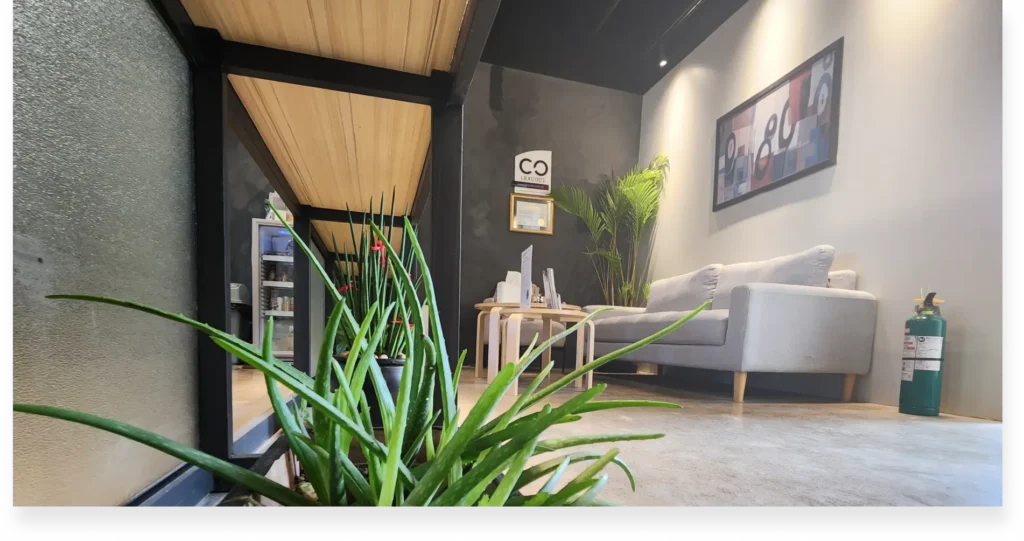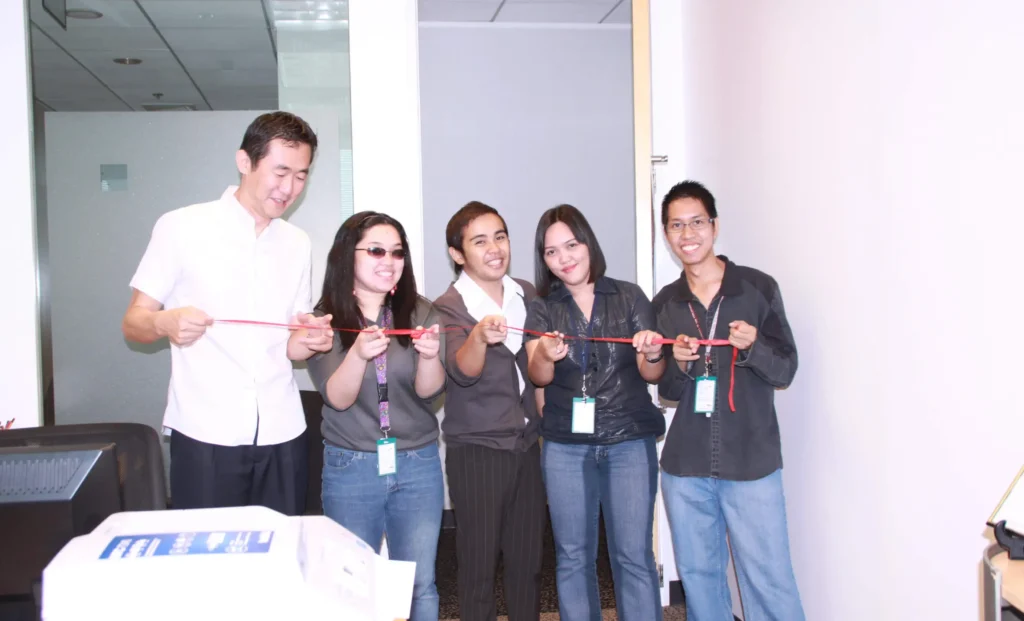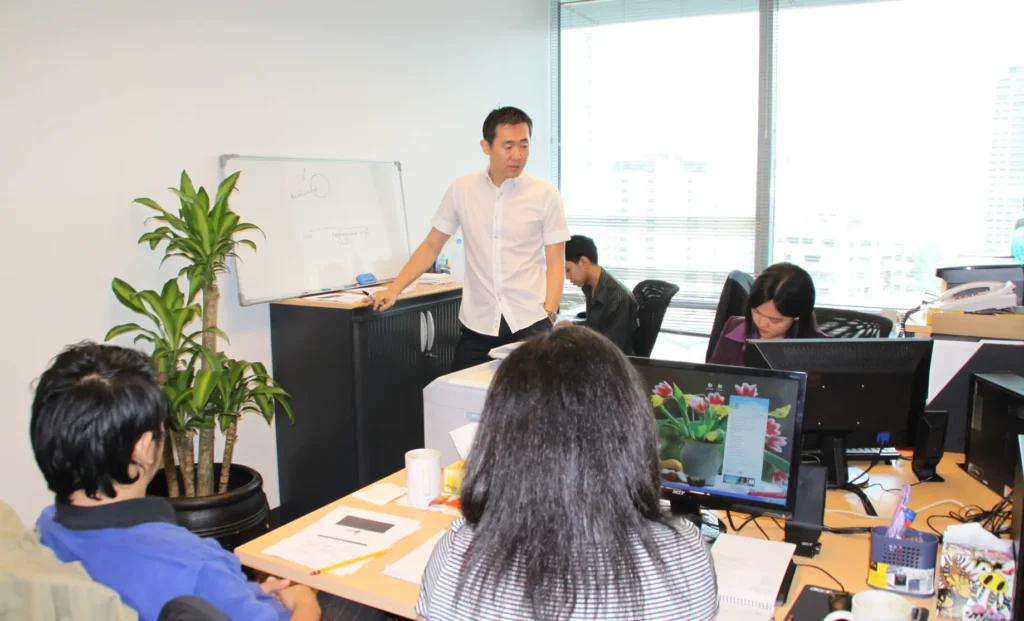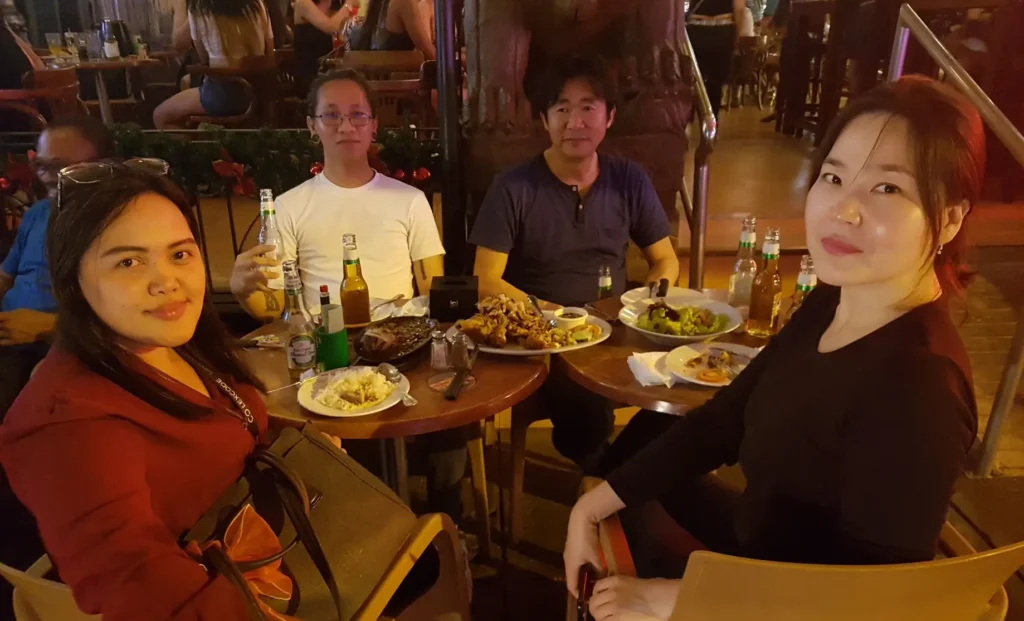
Let me take you back to the summer of 2010, my first year at Lexcode Philippines. On paper, I was an English Editor. By titles, I later became a Project Manager, then a Branch Director. In practice, I did the admin-operations and business development supporting the CEO’s vision, which is how I ended up as his unofficial “secretary.”
He said someone before me had quit because they thought the role was beneath them, too small for someone from a prestigious university. But I didn’t mind. At one point, when I began pulling in sales, he called me a “cash cow” and told me to keep at it. I did—until we earned enough to hire people who could outdo me, which they did. And then there were the odd jobs, the kind you don’t see in job descriptions. One of those was cleaning.

Chul Yong Ham, our CEO, had a knack for making spaces feel better. That tiny 18-square-meter office at the Philamlife Tower where we first met looked, somehow, polished. On his desk sat a stem of white orchids and a bowl of red grapes, which he offered to share—not out of etiquette, but I believe out of habit. On my first day, he uploaded nature wallpapers and elegant music to my computer. That simple act of care stayed with me.
Later, I’d come to understand more about his love for aesthetically pleasing things, especially plants and flowers. His home, filled with them, became a place I enjoyed being in. It mirrored how he lived—focused and purposeful. That’s how he and his wife Misoon, our Korea HQ’s Director, built a workplace that now provides jobs for nearly 100 Korean and Filipino employees.

In those early days, our office ran on the silent rhythms of people who understood work without fanfare: Kuya Bernard was our building’s maintenance man back then, and his wife, Ate Ann, eventually joined us as office assistant—our street-smart clerk, cleaner, cook, and runner, all rolled into one. They, along with our CEO and his wife, stood out as my most missed Lexcodians.
“Mr. Ham” as we called him—whom we came to know as “Young,” because he insisted we drop the formalities—defied some notions of how a CEO should be. He wasn’t after worldly honorifics. He was after something more enduring—respect for the work itself, no matter how small. Young had an eye for the overlooked. He’d wipe the dust off each plant leaf with the same care as he’d approach a business challenge. “No act of care is too small,” he’d say—not in so many words but in the way he lived. What others saw as quirks were lectures in action. The sharpest among them: reject the “slavery mentality.” He meant doing something with all your might, whether scrubbing a floor or sealing a deal. As he wished, I’ll now call him “Young.”

By 2015, we were in Silicon Valley, launching eQQui. The echoes of Young’s lessons followed. I arrived at a spacious three-bedroom apartment that doubled as a home office—its air thick with the staleness of work left undone. I’d just flown in from Manila, touching down at close to 6 PM, worn out but itching to get started. I was alone, thankfully; everyone else had retreated to their rooms. Good, I thought. First task: clean up. A quick survey of the mess, and I was at it, deep into the night, dusting, scrubbing, and arranging until the clock crept past midnight. By 1 AM, everything was in its rightful place, down to the last drawer. Exhausted but triumphant, I crashed into bed. Where did I get the energy? Maybe it was the momentum of that 13-hour flight, or just the quiet thrill of setting things right. It wasn’t the work of cleaning that mattered. It was the act of not waiting for someone else to clear the clutter. The next morning, our VP—a lawyer with a soft spot for good food—treated us to a home-cooked doenjang jjigae, that savory soybean stew. He laughed and said that waking up to clean surroundings had inspired him to feed us.
Months passed, a Filipino colleague, Romeo, joined us—a welcome reminder of home and a balance to the cultural gap, haha. Under Young’s quiet but firm eye, we “grew up” in that strange little home-office setup. We exercised every morning. He showed us how to cut potatoes the “proper” way, how not to stack knives point-up on the dish rack (it wasn’t me), and how to soak rice before cooking it. Breakfast became an art—bagels, buttered corn, a hearty omelet, fresh-ground coffee. He’d have classical piano playing softly in the background. It wasn’t just a routine—it was precision, habit, and harmony.

Young’s lessons were unusual, but they stayed with us. Once, he had me sing the Philippine national anthem, Lupang Hinirang (Chosen Land), while running. “You Filipinos talk too much,” he’d joke, but his point landed: focus matters. He drilled into us the importance of pushing through, of “sucking it up,” as he’d say. I remember one night when Romeo fell sick just as we were preparing to send the eQQui welcome emails. Young told him, “Please send those first, then you can go back to being sick,” driving home the lesson of pushing through even when you’re barely holding on. In his own way, he was a wise nurturer. When I first caught a cold that winter, he carefully went through each medicine on the drugstore shelves, read the ingredients like a hawk, and then chose the least expensive yet most effective one.
Frugality in medicine, perhaps, but not in food. We’re never without rice, chicken, and bananas—ever! We ate in many local restaurants he’d discovered. He prepared yummy home-cooked Korean and American dishes! Our in-house chef, with no choice but to cook lest we starve, served us the most flavorful, rich meals. He eventually caught on and, clearly irritated, whined about becoming a servant to his unsophisticated third-world employees. Then there’s our awe as he brought us under Yosemite’s towering trees and gazed at the Lone Cypress along Pebble Beach, dreaming of being neighbors in our own beachfront homes!
Now, cleaning might sound menial to some people. Something to grumble about. For me, cleaning wasn’t drudgery; it was relaxation. Weird but true. Scrubbing, wiping, organizing—it was grounding. Hands busy, mind clear. The effort pulled me out of my head and into the urgency of now. Young was the kind of leader who noticed this—not the tasks themselves, but what they revealed about the doer.

Young is family. When we arrived in the US, Young looked aged and rugged, as if he hadn’t had the time to care for himself. But once we were all together again, he shaved, stood taller, and his smile returned! Maybe it was optimism, or maybe a sense of duty. He treated Romeo, that scruffy IT kid, like his own son—once even firing him to drive a point home, yet nurturing him with advice and sarcasm only they could understand.
Before the spring of 2016, we packed everything in that eQQui home office and cleaned every corner again. I still have the photos, the cluttered ‘befores’ and the pristine ‘afters.’ A visual reminder of the transformation Lexcode led us through—not just of spaces but of ourselves. Every image, every memory is a reminder: love isn’t grandiose, but it changes things—it steadies the mess and sets things straight. Looking back, some of those memories make me laugh, others make me pause. They all remind me of one thing: how small acts, carried out in earnest, can change you in ways you can’t measure.
My life has taken on a different shape post-pandemic here in Canada—work still happens mostly remotely, through screens and speakers, pixels and text. I’ve learned that care travels differently across the distance.
Naturally, there have been missteps. I was too hesitant to reach out and missed vital moments of connection. Those regrets serve as reminders that presence is also measured by output. Performing fully, even from afar—that’s the heart of it. A follow-up email, a deliberate pause to listen, a moment to think before replying.
These days, I find quiet joy in the discipline I once struggled with. Without it, and without faith, distance can dull even the sharpest resolve. Striving to live rightly each day—without fanfare—brings me a steady, abiding happiness whether in person or online. I keep in mind that our lives are often the only self-help videos someone else might watch. At first, people may dismiss good examples, even push back against them, but years down the line, after seeing your consistency from a distance, it stays with them. It works its way into life, and quietly changes things for the better.
Looking back, the jobs I held before Lexcode’s increased my persistence. As a social worker, I learned to meet people where they were, often in places of hardship and sorrow. In a leprosarium, I saw dignity where most would turn away. Journalism taught me to listen, not just to words, but to what lies beneath them. When I assisted forensic pathologists in performing autopsies and exhumations, I came face-to-face with life’s fragility and the unrelenting nature of death. Training seafarers became a mirror of the reality I would face as an immigrant myself. Writing children’s textbooks from a mango farm—with long days capped by warm carabao’s milk and a midnight snack of fried pork tocino and pancit canton, weekend strolls at fishponds, paddies, and markets of Science City of Muñoz—made stressful deadlines bearable. Tenacity doesn’t come with titles—that much those roles taught me.
Since my family lived abroad in 2022, my markers of identity fell away. I was replanted in the strange, new air. All the old comforts were little more than autumn leaves scattered in the wind. There’s freedom in shedding the titles, labels, and clichés of ‘leadership.’ And that, in itself, was a gift. I rediscovered who I was beyond the roles I had once defined myself by. Coming to Canada encouraged me to make space for other Lexcodians to lead.
Decluttering is a discipline. It’s about understanding that each act carries the weight of intention. It has taught me to stop my misconduct and make amends for the times I’ve fallen short. It has created space for an old-school lifestyle, free from endless wants and worries.
As a mother of two bright, precious daughters—both already exploring the skill of tidying up—I’ve had to redefine what it means to declutter. It lies in small, consistent efforts to let go of bad habits. It’s about demonstrating to my children the importance of making space for activities that enrich not just our pockets but our spirits.
After work, I revive my soul. I enjoy the beautiful view and meaningful mealtime conversations with my family. I carve out time in my day to pray and give thanks to the Lord.
The future calls me to keep moving forward with conviction, despite the odds. That’s what I’ve been doing ever since one interpretation project led me to learn simultaneous interpretation. At the time, we needed an SI for a low-budget client. I self-studied and gradually picked up the skill. Was it perfect? Not at all. But in that attempt, a message took root—not just for me, but for others as well: with faith and grit, barriers can become opportunities.
Now that I’m working with nonprofits, it feels like I’m back in a garden, nurturing something so fragile—something that, with care, will flourish. It reminds me of Lexcode, of those early days building something enduring that has quietly strengthened me ever since. And I’ll keep cleaning as I go, to make new spaces much better than I found them.
Cleaning As I Go
The time with you guys in Silicon Valley was the most fierceful, agonizing and striving time in my life. You and Romeo were among a few people I could rely on and, oh my gosh, we made beautiful memories and you made a beautiful daughter soon after!